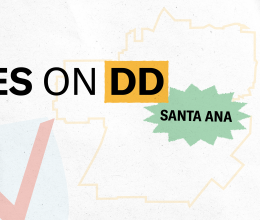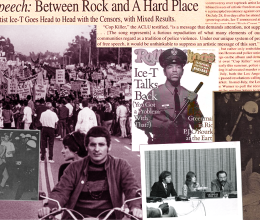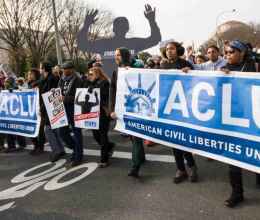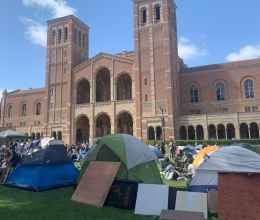Blair v. Regents of the University of California is a lawsuit challenging the suppression of student and faculty speech by UCLA administrators that culminated in the violent destruction of the Palestine Solidarity Encampment on May 2, 2024. By shutting down the encampment because of its speech content, UCLA and University of California (UC) administrators undermined the role of universities to foster critical thought and expression.
The following is an interview between ACLU SoCal Senior Staff Attorney Mohammad Tajsar, and three of the plaintiffs in Blair: Associate Professor of Political Science Graeme Blair; Benjamin Kersten, a graduate student in the Department of Art History; and Associate Professor of Anthropology Salih Can Açıksöz.
Mohammad Tajsar (MT): Why did you participate in the UCLA Palestine Solidarity Encampment in Spring 2024?
Graeme Blair (GB): I joined as a faculty member because I believe that the teaching mission of the university extends beyond the classroom – including protests. Student politics often represents the vanguard of social change, from the civil rights struggle to the Vietnam war. Protecting student speech and conscience is important for our society, not just campus life. I also agreed with their message: I do not want my workplace to continue to be complicit in Israel’s genocidal campaign in Gaza. For these reasons, I wanted students and UCLA administrators to know that I supported student’s right to hold this protest.
Benjamin Kersten (BK): I participated in the encampment out of a political and moral obligation to take action. The universities in Gaza have been turned into graveyards. Meanwhile, our university administrators in the U.S. are cracking down on Palestine solidarity activism, ceding ground to right-wing legislators bent on attacking the autonomy of universities and civil rights. Taking part in the encampment was therefore not just an act of solidarity with Palestinians but also an effort to reclaim the campus as a space for critical thinking and collective action toward a world of equality, justice, and dignity for all, without exception.
Salih Can Açıksöz (SCA): I wanted to be there for my students. Having witnessed unprecedented police brutality on various campuses across the U.S., including my alma mater, UT Austin, I was alarmed by the possibility of similar occurrences at our campus and wanted to offer my support.
MT: How would you describe the Palestine Solidary Encampment to someone who was not there to see it?
BK: For seven days, we created a world of possibility, multicultural and interfaith community, collective care, and fierce principles. The encampment claimed space and filled it with art, prayer, music, food, healthcare, and education. There was a lending library. A handwashing station. A medical tent stocked with every variety of sunscreen and bandage. A food tent with warm dishes and matzah for those of us keeping kosher for Passover. The encampment was also a space where students and workers stepped up to support each other and took responsibility for keeping each other safe.
SCA: I once described the encampment as “the most beautiful thing I have seen in my eight years at UCLA.” The media often portrayed it in a propagandistic light, depicting it as a violent and dangerous space rife with antisemitism. In reality, however, the encampment was a vibrant gathering where students from diverse backgrounds came together to protest, socialize, study, pray, eat, dance, and perform music.
Royce Quad lawn is regularly reserved for private events and often inaccessible to students. Through the encampment, students transformed it into a democratic experiment in self-governance, mutual care, and support. As an educator aware of students' alienation in our institutions, I was particularly moved by their unwavering commitment to educating themselves and others on the pressing issues of our time. Their dedication to nonviolence was equally poignant; despite facing numerous attacks on the encampment, students maintained their composure and prioritized de-escalation, even during the horrific mob attack on April 30, 2024.
GB: I was struck by how focused the encampment was on learning. The organized program included teach-ins, reading circles, and group discussions. There were posters on Palestine’s history and geography. The conversations I heard, and joined, were about what divestment from the war in Gaza could look like, the history of police repression of protests, and Palestinian politics. Students stayed up late reading about UCLA’s investments.
The commitment to learning was demonstrated viscerally when counterprotesters started streaming by the encampment, hours after it opened. Despite menacing, hateful language, and physical provocations of the counterprotesters, the students refused to engage, insisting they stay focused on their mission to learn about Palestine and strategize about campus divestment. The commitment was sustained even as they were subjected to blasting, torturous music in the middle of the night and physical assaults, not to mention a horrific four-hour-long mob attack.
MT: The university violently shut down the student encampment, and in the process arrested more than 200 students, faculty, and community members. How did you feel about the university’s actions?
BK: I can still hear the relentless sound of the stun grenades. Trepidation still courses through my body when I think about police in riot gear shooting rubber bullets at and beating students and friends. The university betrayed us and could have listened to the students and workers by taking meaningful steps to withdraw its support from Israeli human rights violations, war crimes, and crimes against humanity. Instead, the university chose to brutalize members of our community, who had already withstood attacks from mobs spewing racist epithets. I am sickened to think of how the university would rather give in to an authoritarian political culture that violently punishes dissent than move toward ethical investment practices.
SCA: One word: Appalled. The University of California has a long and enduring legacy of civil disobedience. In the early days of the encampment, I naively believed that this legacy would inform the university’s approach. However, my initial optimism was quickly shattered by the university’s biased messages and their troubling decision to allow a jumbotron to be erected across from the encampment, broadcasting traumatizing content in violation of the university's own policies.
For days, this jumbotron became a rallying point for violent instigators, who attacked the encampment with impunity while administrators and private security simply stood by. The university then used this mob violence as an excuse to subject our community to further violence under the guise of ensuring campus safety, effectively turning the campus into a war zone. I cannot forget the faces of students terrorized by flashbang explosions.
The university had a crucial opportunity to heal wounds and end the encampment peacefully on the day of the police clearance when the provost met with protesting students. Yet, leadership caved to political pressure and resorted to police violence to crack down on those peacefully protesting.
GB: Along with faculty and staff colleagues, I was arrested at the encampment while facing down state police officers in riot gear wielding weapons loaded with rubber-coated bullets, pointed at our students, while police flash bangs exploded over our heads. It is a scene I hope to never see again. The brutal chaos that ensued when students tossed through the air and were shot by rubber bullets at close range — was terrifying. UCLA and UC leaders chose to subject their own students to this police violence when students were simply using their voice to call for social change. I am disgusted not only by their callous disregard for our students’ safety, but their continuing defense of this violence in the name of protecting the students and public order.
MT: Why are you bringing this lawsuit against the University of California and UCLA?
BK: The University of California and UCLA have repeatedly demonstrated bias against Palestinians and those who stand in solidarity with Palestinians, and this must be seen as an egregious violation of protected speech and political activity. I am bringing this lawsuit because I want justice for those who showed courage and creativity, who witnessed some of the most heart-wrenching images to ever circulate and chose solidarity. While I first and foremost want to end the repression of pro-Palestinian activism, I also know that this sort of political repression exists in a wider context. The repression of pro-Palestinian activism builds on and paves the way for more repression of those taking stands for social justice in opposition to systemic violence and the institutions that perpetuate it.
SCA: I see this lawsuit as a test case for the limits of freedom of speech and expression in the U.S. To my knowledge, there is no First Amendment exception for Palestine; yet, universities have attempted to censor or shut down pro-Palestinian speech, undermining the constitutionally protected rights of students and faculty. At UCLA, this violation of constitutional rights has taken on a particularly grotesque and chilling form. The university has not only failed to protect the rights of pro-Palestinian students, staff, and faculty to freedom of speech and expression but has actively curtailed them. This has occurred through inadequate responses to safety concerns raised before and during the April 30, 2024, mob attack, followed by the use of those concerns to suppress the right to protest peacefully. I hope this lawsuit will serve as a breakthrough in safeguarding our right to protest against another country’s genocidal actions, allowing us to do so without fear of reprisal or police violence.
GB: UCLA and UC’s closure of the encampment was cynical. Administrators said the protest became dangerous. In a way, they were right: the encampment was the site of violence the night before during the mob attack. But as has been widely documented, it was entirely one-sided, directed by outsiders against our students. The mob violence was nothing more than a cover for the reason UCLA wanted to shut down the protest: to act on calls from some students, faculty, alumni, and donors, who said the protest made them feel unsafe. I take their claim of discomfort at face value, but also know that it is an insufficient justification for shutting down other students’ speech. I join this lawsuit to ensure that the pretext of safety cannot be wielded by public institutions to shut down speech, as it was last spring at UCLA and campuses across the country.
Read more about Blair v. Regents of the University of California.




